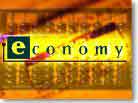|
Fed chief defends bailout
|
 |
October 1, 1998: 1:38 p.m. ET
Greenspan says failure of hedge fund could have damaged U.S. economy
|
NEW YORK (CNNfn) - Federal Reserve Chairman Alan Greenspan Thursday defended the Fed's involvement in the $3.5 billion rescue of Long-Term Capital Management, saying a failure of the hedge fund could have hurt many economies, including the United States'.
In his testimony to the House Banking Committee, Greenspan said volatile market conditions called for a speedy resolution to LTCM's troubles.
"Had the failure of LTCM triggered the seizing up of markets, substantial damage could have been inflicted on many market participants, including some not directly involved with the firm, and could have potentially impaired the economies of many nations, including our own," Greenspan said.
The hearing comes as the banking industry is still assessing the damage from last week's $3.5 billion bailout of LTCM.
Committee members debated whether the Federal Reserve should be involved in any bailout efforts of hedge funds. The Federal Reserve Bank of New York participated in the bailout negotiations in which 14 financial institutions, including Merrill Lynch & Co. (MER) and Morgan Stanley Dean Witter (MWD), raised funds to rescue LTCM.
But Greenspan, along with New York Fed President William McDonough, stressed that LTCM's rescue was not a government bailout because public funds were not involved in the effort.
"The Federal Reserve Bank of New York's efforts were designed solely to enhance the probability of an orderly private-sector adjustment," Greenspan said. "No Federal Reserve funds were put at risk, no promises were made by the Federal Reserve and no individual firms were pressured to participate."
Greenspan also said the Fed's involvement was justified because the LTCM situation should be viewed as a "rare occasion, warranted because of the potential for serious disruptions to markets."
Antitrust issues
Nonetheless, House Banking Committee Chairman James Leach said the consortium assembled to rescue LTCM warrants a review by the Justice Department on antitrust grounds, noting that such a "quasi-cartel" would hold too much influence over financial markets.
"The combination of many of the world's most sophisticated financial powerhouses to operate jointly hedge-fund activities may add up to more sway over relative currency values than any central bank or finance ministry in the world can match," Leach said.
"Working as a cartel, these institutions could influence economies for good or for naught, potentially in ways that may not be guided by any standard of national or international interest."
Greenspan responded that he is far less concerned with those issues than Leach.
Regulation issues
Hedge funds, investment pools commonly used by the wealthy, are unregulated.
Greenspan said the government should tread lightly when it considers imposing regulations on hedge funds.
"It is questionable whether hedge funds can be effectively directly regulated in the United States alone," he said.
"While their financial clout may be large, hedge funds' physical presence is small. Any direct U.S. regulations restricting their flexibility will doubtless induce the more aggressive funds to emigrate from under our jurisdiction. The best we can do in my judgment is what we do today: Regulate them indirectly through the regulation of the sources of their funds."
Several committee members raised the issue of whether the government should require hedge funds, as it does with mutual funds, to disclose their leverage ratio and capital base.
Both Greenspan and McDonough, however, said the banks that act as counterparties to hedge funds provide the most effective way of controlling risk.
"The major element of the control of leverage and capital is the structure of the counterparty relationship," Greenspan said.
"Those who lend money [to hedge funds] have an interest in getting it back. The ability of banks to act as counterparties has been very successful in recent years. The loss ratio is very low. But they are going to make mistakes. I know of no piece of legislation that can be passed by Congress that can prevent [banks] from making dumb mistakes."
Chase Manhattan Corp. (CMB), the nation's largest bank, earlier this week disclosed that roughly $3.2 billion of its total loan portfolio is exposed to hedge funds.
Officials from LTCM and the banks that helped bail it out declined an invitation to testify at the hearing. 
|
|
|
|
|
 |

|

